The Influence of Digital Technology on Tesco's Business Operations
VerifiedAdded on 2020/12/10
|29
|7829
|89
Report
AI Summary
This research project investigates the influence of digital technology on Tesco's day-to-day business operations in London. The study aims to identify the importance and applications of digital technology, analyze its impact on Tesco's processes (production, marketing, human resources, supply chain), and examine the challenges faced during implementation. The research includes a thorough literature review, exploring the views of various authors on digital technologies' impact on businesses, along with an examination of the research methodology utilized. The researcher employs a quantitative research strategy, collecting data from Tesco managers through questionnaires and using thematic analysis for data interpretation. The report also details the data collection methods, including primary and secondary sources, research design and approach, and a timeline of research activities. The project highlights the significance of digital technologies in enhancing efficiency, productivity, and overall business performance, while acknowledging associated challenges such as the need for expertise and potential technical issues.

RESEARCH PROJECT 2
Paraphrase This Document
Need a fresh take? Get an instant paraphrase of this document with our AI Paraphraser
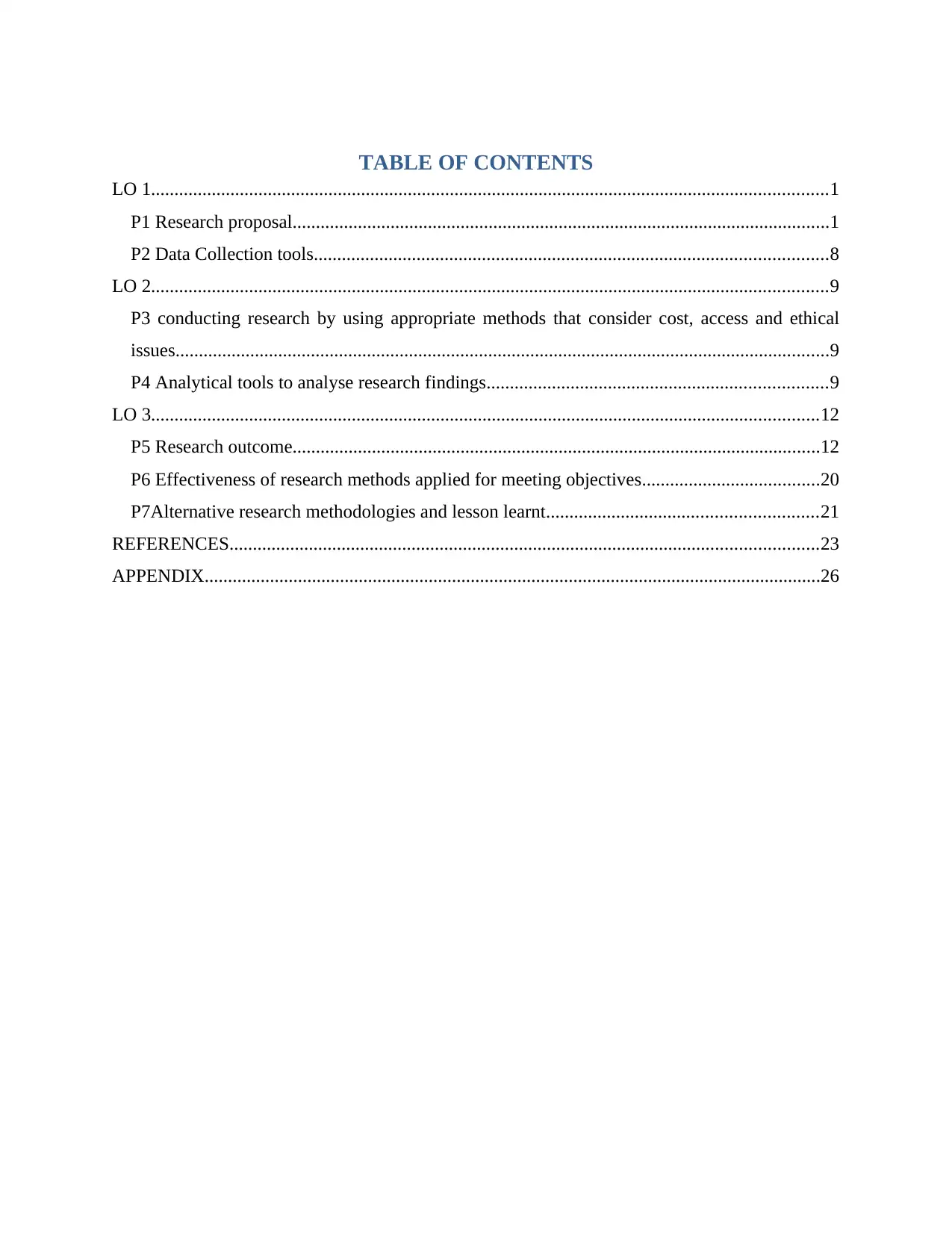
TABLE OF CONTENTS
LO 1.................................................................................................................................................1
P1 Research proposal...................................................................................................................1
P2 Data Collection tools..............................................................................................................8
LO 2.................................................................................................................................................9
P3 conducting research by using appropriate methods that consider cost, access and ethical
issues............................................................................................................................................9
P4 Analytical tools to analyse research findings.........................................................................9
LO 3...............................................................................................................................................12
P5 Research outcome.................................................................................................................12
P6 Effectiveness of research methods applied for meeting objectives......................................20
P7Alternative research methodologies and lesson learnt..........................................................21
REFERENCES..............................................................................................................................23
APPENDIX....................................................................................................................................26
LO 1.................................................................................................................................................1
P1 Research proposal...................................................................................................................1
P2 Data Collection tools..............................................................................................................8
LO 2.................................................................................................................................................9
P3 conducting research by using appropriate methods that consider cost, access and ethical
issues............................................................................................................................................9
P4 Analytical tools to analyse research findings.........................................................................9
LO 3...............................................................................................................................................12
P5 Research outcome.................................................................................................................12
P6 Effectiveness of research methods applied for meeting objectives......................................20
P7Alternative research methodologies and lesson learnt..........................................................21
REFERENCES..............................................................................................................................23
APPENDIX....................................................................................................................................26
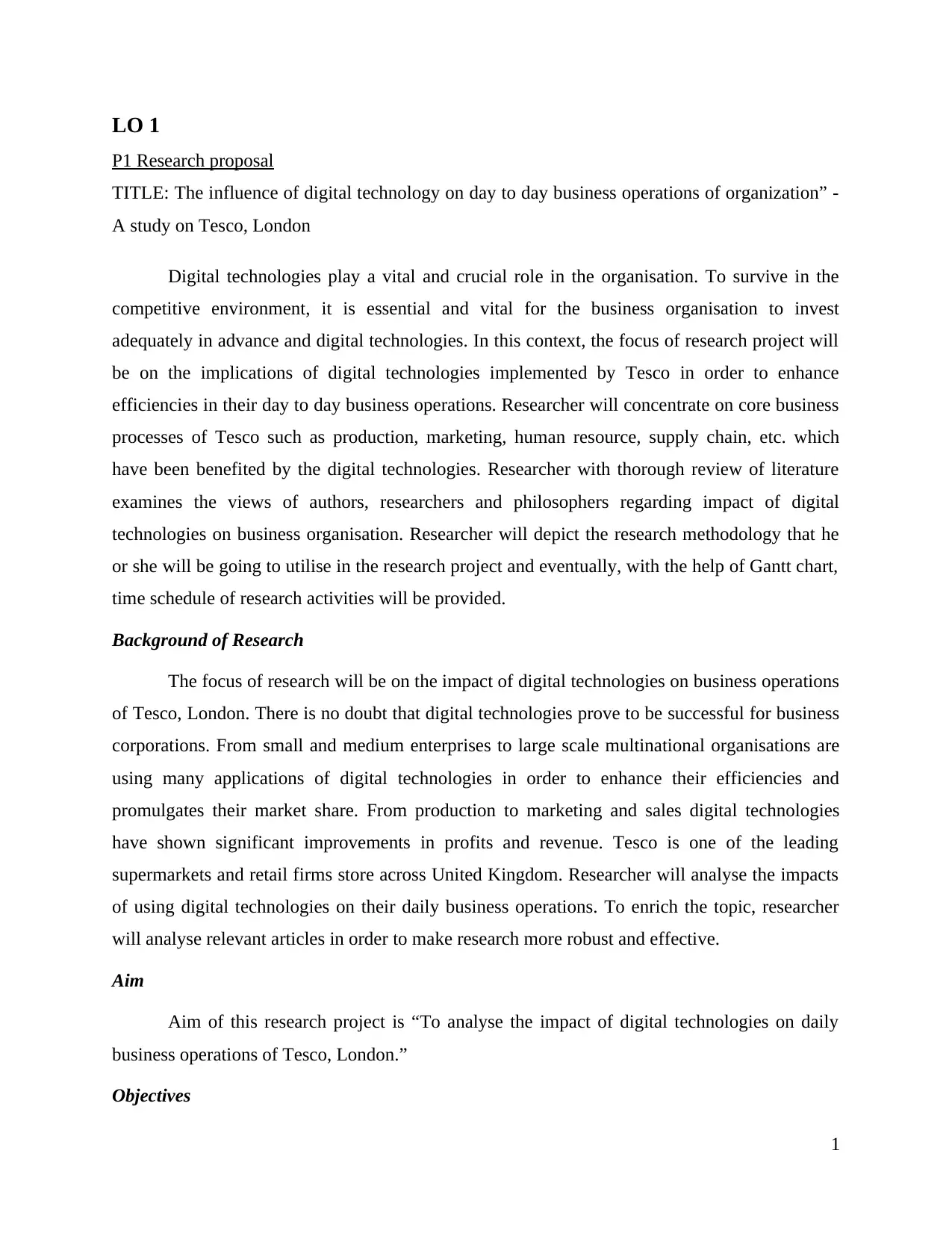
LO 1
P1 Research proposal
TITLE: The influence of digital technology on day to day business operations of organization” -
A study on Tesco, London
Digital technologies play a vital and crucial role in the organisation. To survive in the
competitive environment, it is essential and vital for the business organisation to invest
adequately in advance and digital technologies. In this context, the focus of research project will
be on the implications of digital technologies implemented by Tesco in order to enhance
efficiencies in their day to day business operations. Researcher will concentrate on core business
processes of Tesco such as production, marketing, human resource, supply chain, etc. which
have been benefited by the digital technologies. Researcher with thorough review of literature
examines the views of authors, researchers and philosophers regarding impact of digital
technologies on business organisation. Researcher will depict the research methodology that he
or she will be going to utilise in the research project and eventually, with the help of Gantt chart,
time schedule of research activities will be provided.
Background of Research
The focus of research will be on the impact of digital technologies on business operations
of Tesco, London. There is no doubt that digital technologies prove to be successful for business
corporations. From small and medium enterprises to large scale multinational organisations are
using many applications of digital technologies in order to enhance their efficiencies and
promulgates their market share. From production to marketing and sales digital technologies
have shown significant improvements in profits and revenue. Tesco is one of the leading
supermarkets and retail firms store across United Kingdom. Researcher will analyse the impacts
of using digital technologies on their daily business operations. To enrich the topic, researcher
will analyse relevant articles in order to make research more robust and effective.
Aim
Aim of this research project is “To analyse the impact of digital technologies on daily
business operations of Tesco, London.”
Objectives
1
P1 Research proposal
TITLE: The influence of digital technology on day to day business operations of organization” -
A study on Tesco, London
Digital technologies play a vital and crucial role in the organisation. To survive in the
competitive environment, it is essential and vital for the business organisation to invest
adequately in advance and digital technologies. In this context, the focus of research project will
be on the implications of digital technologies implemented by Tesco in order to enhance
efficiencies in their day to day business operations. Researcher will concentrate on core business
processes of Tesco such as production, marketing, human resource, supply chain, etc. which
have been benefited by the digital technologies. Researcher with thorough review of literature
examines the views of authors, researchers and philosophers regarding impact of digital
technologies on business organisation. Researcher will depict the research methodology that he
or she will be going to utilise in the research project and eventually, with the help of Gantt chart,
time schedule of research activities will be provided.
Background of Research
The focus of research will be on the impact of digital technologies on business operations
of Tesco, London. There is no doubt that digital technologies prove to be successful for business
corporations. From small and medium enterprises to large scale multinational organisations are
using many applications of digital technologies in order to enhance their efficiencies and
promulgates their market share. From production to marketing and sales digital technologies
have shown significant improvements in profits and revenue. Tesco is one of the leading
supermarkets and retail firms store across United Kingdom. Researcher will analyse the impacts
of using digital technologies on their daily business operations. To enrich the topic, researcher
will analyse relevant articles in order to make research more robust and effective.
Aim
Aim of this research project is “To analyse the impact of digital technologies on daily
business operations of Tesco, London.”
Objectives
1
⊘ This is a preview!⊘
Do you want full access?
Subscribe today to unlock all pages.

Trusted by 1+ million students worldwide
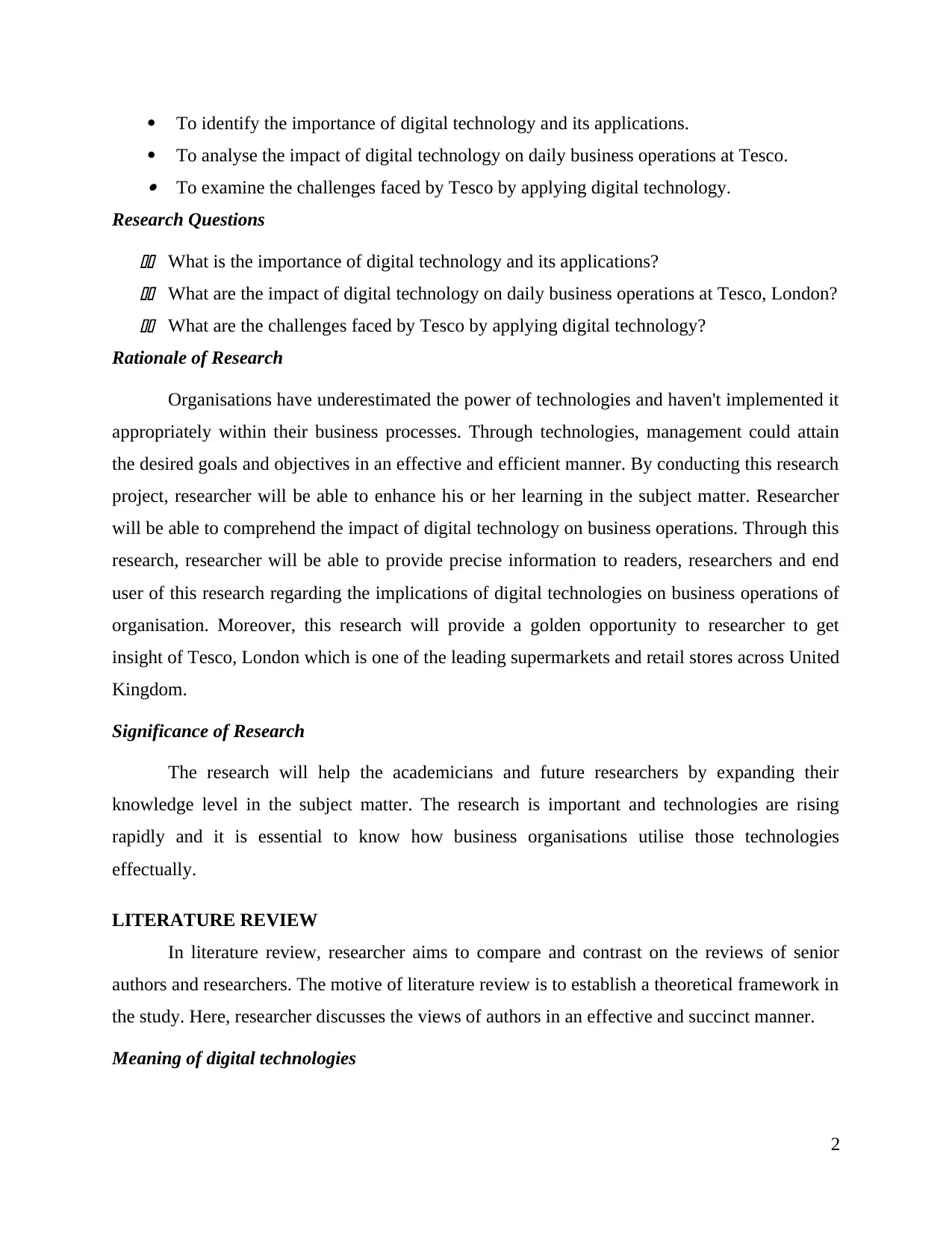
To identify the importance of digital technology and its applications.
To analyse the impact of digital technology on daily business operations at Tesco. To examine the challenges faced by Tesco by applying digital technology.
Research Questions11 What is the importance of digital technology and its applications?11 What are the impact of digital technology on daily business operations at Tesco, London?11 What are the challenges faced by Tesco by applying digital technology?
Rationale of Research
Organisations have underestimated the power of technologies and haven't implemented it
appropriately within their business processes. Through technologies, management could attain
the desired goals and objectives in an effective and efficient manner. By conducting this research
project, researcher will be able to enhance his or her learning in the subject matter. Researcher
will be able to comprehend the impact of digital technology on business operations. Through this
research, researcher will be able to provide precise information to readers, researchers and end
user of this research regarding the implications of digital technologies on business operations of
organisation. Moreover, this research will provide a golden opportunity to researcher to get
insight of Tesco, London which is one of the leading supermarkets and retail stores across United
Kingdom.
Significance of Research
The research will help the academicians and future researchers by expanding their
knowledge level in the subject matter. The research is important and technologies are rising
rapidly and it is essential to know how business organisations utilise those technologies
effectually.
LITERATURE REVIEW
In literature review, researcher aims to compare and contrast on the reviews of senior
authors and researchers. The motive of literature review is to establish a theoretical framework in
the study. Here, researcher discusses the views of authors in an effective and succinct manner.
Meaning of digital technologies
2
To analyse the impact of digital technology on daily business operations at Tesco. To examine the challenges faced by Tesco by applying digital technology.
Research Questions11 What is the importance of digital technology and its applications?11 What are the impact of digital technology on daily business operations at Tesco, London?11 What are the challenges faced by Tesco by applying digital technology?
Rationale of Research
Organisations have underestimated the power of technologies and haven't implemented it
appropriately within their business processes. Through technologies, management could attain
the desired goals and objectives in an effective and efficient manner. By conducting this research
project, researcher will be able to enhance his or her learning in the subject matter. Researcher
will be able to comprehend the impact of digital technology on business operations. Through this
research, researcher will be able to provide precise information to readers, researchers and end
user of this research regarding the implications of digital technologies on business operations of
organisation. Moreover, this research will provide a golden opportunity to researcher to get
insight of Tesco, London which is one of the leading supermarkets and retail stores across United
Kingdom.
Significance of Research
The research will help the academicians and future researchers by expanding their
knowledge level in the subject matter. The research is important and technologies are rising
rapidly and it is essential to know how business organisations utilise those technologies
effectually.
LITERATURE REVIEW
In literature review, researcher aims to compare and contrast on the reviews of senior
authors and researchers. The motive of literature review is to establish a theoretical framework in
the study. Here, researcher discusses the views of authors in an effective and succinct manner.
Meaning of digital technologies
2
Paraphrase This Document
Need a fresh take? Get an instant paraphrase of this document with our AI Paraphraser
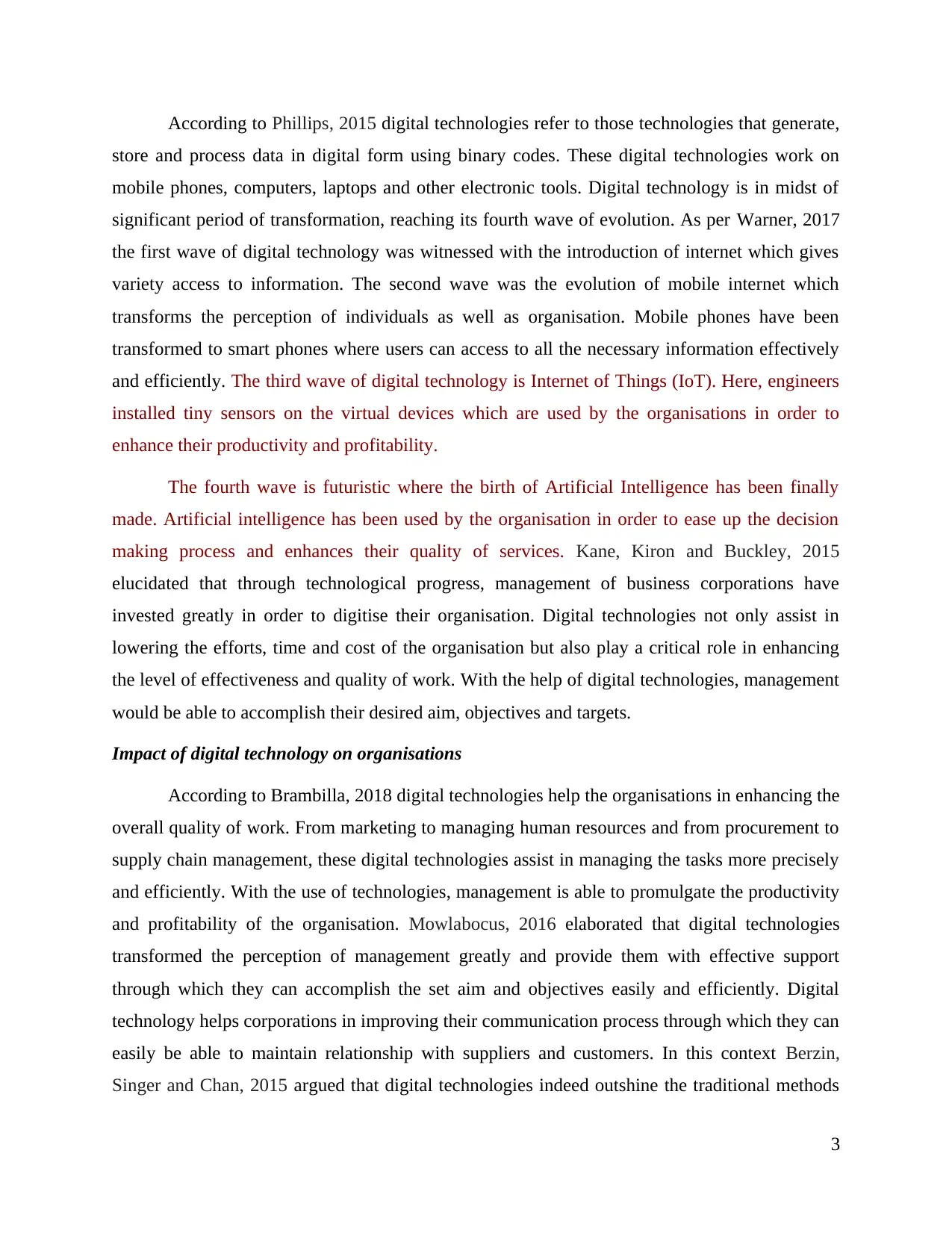
According to Phillips, 2015 digital technologies refer to those technologies that generate,
store and process data in digital form using binary codes. These digital technologies work on
mobile phones, computers, laptops and other electronic tools. Digital technology is in midst of
significant period of transformation, reaching its fourth wave of evolution. As per Warner, 2017
the first wave of digital technology was witnessed with the introduction of internet which gives
variety access to information. The second wave was the evolution of mobile internet which
transforms the perception of individuals as well as organisation. Mobile phones have been
transformed to smart phones where users can access to all the necessary information effectively
and efficiently. The third wave of digital technology is Internet of Things (IoT). Here, engineers
installed tiny sensors on the virtual devices which are used by the organisations in order to
enhance their productivity and profitability.
The fourth wave is futuristic where the birth of Artificial Intelligence has been finally
made. Artificial intelligence has been used by the organisation in order to ease up the decision
making process and enhances their quality of services. Kane, Kiron and Buckley, 2015
elucidated that through technological progress, management of business corporations have
invested greatly in order to digitise their organisation. Digital technologies not only assist in
lowering the efforts, time and cost of the organisation but also play a critical role in enhancing
the level of effectiveness and quality of work. With the help of digital technologies, management
would be able to accomplish their desired aim, objectives and targets.
Impact of digital technology on organisations
According to Brambilla, 2018 digital technologies help the organisations in enhancing the
overall quality of work. From marketing to managing human resources and from procurement to
supply chain management, these digital technologies assist in managing the tasks more precisely
and efficiently. With the use of technologies, management is able to promulgate the productivity
and profitability of the organisation. Mowlabocus, 2016 elaborated that digital technologies
transformed the perception of management greatly and provide them with effective support
through which they can accomplish the set aim and objectives easily and efficiently. Digital
technology helps corporations in improving their communication process through which they can
easily be able to maintain relationship with suppliers and customers. In this context Berzin,
Singer and Chan, 2015 argued that digital technologies indeed outshine the traditional methods
3
store and process data in digital form using binary codes. These digital technologies work on
mobile phones, computers, laptops and other electronic tools. Digital technology is in midst of
significant period of transformation, reaching its fourth wave of evolution. As per Warner, 2017
the first wave of digital technology was witnessed with the introduction of internet which gives
variety access to information. The second wave was the evolution of mobile internet which
transforms the perception of individuals as well as organisation. Mobile phones have been
transformed to smart phones where users can access to all the necessary information effectively
and efficiently. The third wave of digital technology is Internet of Things (IoT). Here, engineers
installed tiny sensors on the virtual devices which are used by the organisations in order to
enhance their productivity and profitability.
The fourth wave is futuristic where the birth of Artificial Intelligence has been finally
made. Artificial intelligence has been used by the organisation in order to ease up the decision
making process and enhances their quality of services. Kane, Kiron and Buckley, 2015
elucidated that through technological progress, management of business corporations have
invested greatly in order to digitise their organisation. Digital technologies not only assist in
lowering the efforts, time and cost of the organisation but also play a critical role in enhancing
the level of effectiveness and quality of work. With the help of digital technologies, management
would be able to accomplish their desired aim, objectives and targets.
Impact of digital technology on organisations
According to Brambilla, 2018 digital technologies help the organisations in enhancing the
overall quality of work. From marketing to managing human resources and from procurement to
supply chain management, these digital technologies assist in managing the tasks more precisely
and efficiently. With the use of technologies, management is able to promulgate the productivity
and profitability of the organisation. Mowlabocus, 2016 elaborated that digital technologies
transformed the perception of management greatly and provide them with effective support
through which they can accomplish the set aim and objectives easily and efficiently. Digital
technology helps corporations in improving their communication process through which they can
easily be able to maintain relationship with suppliers and customers. In this context Berzin,
Singer and Chan, 2015 argued that digital technologies indeed outshine the traditional methods
3
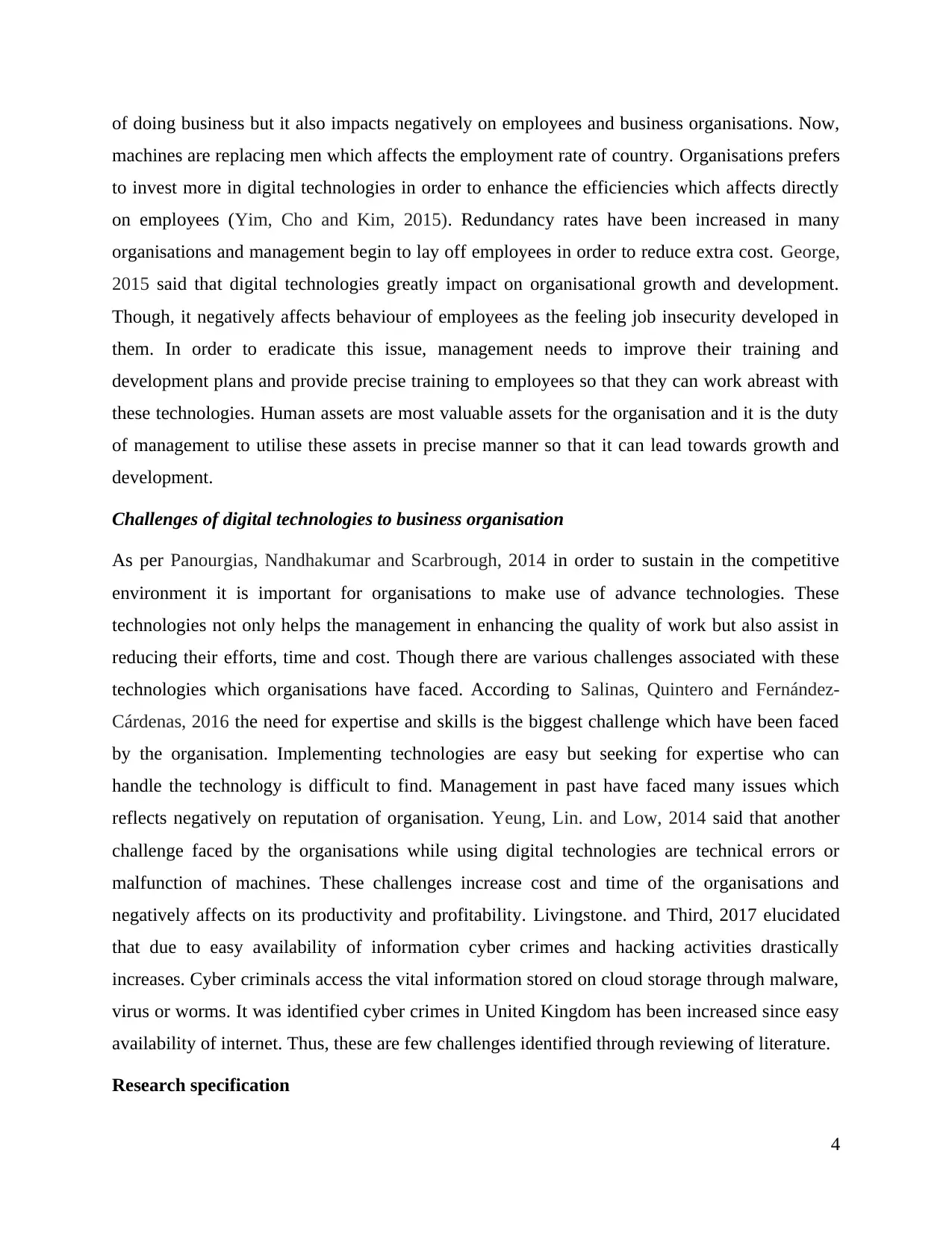
of doing business but it also impacts negatively on employees and business organisations. Now,
machines are replacing men which affects the employment rate of country. Organisations prefers
to invest more in digital technologies in order to enhance the efficiencies which affects directly
on employees (Yim, Cho and Kim, 2015). Redundancy rates have been increased in many
organisations and management begin to lay off employees in order to reduce extra cost. George,
2015 said that digital technologies greatly impact on organisational growth and development.
Though, it negatively affects behaviour of employees as the feeling job insecurity developed in
them. In order to eradicate this issue, management needs to improve their training and
development plans and provide precise training to employees so that they can work abreast with
these technologies. Human assets are most valuable assets for the organisation and it is the duty
of management to utilise these assets in precise manner so that it can lead towards growth and
development.
Challenges of digital technologies to business organisation
As per Panourgias, Nandhakumar and Scarbrough, 2014 in order to sustain in the competitive
environment it is important for organisations to make use of advance technologies. These
technologies not only helps the management in enhancing the quality of work but also assist in
reducing their efforts, time and cost. Though there are various challenges associated with these
technologies which organisations have faced. According to Salinas, Quintero and Fernández-
Cárdenas, 2016 the need for expertise and skills is the biggest challenge which have been faced
by the organisation. Implementing technologies are easy but seeking for expertise who can
handle the technology is difficult to find. Management in past have faced many issues which
reflects negatively on reputation of organisation. Yeung, Lin. and Low, 2014 said that another
challenge faced by the organisations while using digital technologies are technical errors or
malfunction of machines. These challenges increase cost and time of the organisations and
negatively affects on its productivity and profitability. Livingstone. and Third, 2017 elucidated
that due to easy availability of information cyber crimes and hacking activities drastically
increases. Cyber criminals access the vital information stored on cloud storage through malware,
virus or worms. It was identified cyber crimes in United Kingdom has been increased since easy
availability of internet. Thus, these are few challenges identified through reviewing of literature.
Research specification
4
machines are replacing men which affects the employment rate of country. Organisations prefers
to invest more in digital technologies in order to enhance the efficiencies which affects directly
on employees (Yim, Cho and Kim, 2015). Redundancy rates have been increased in many
organisations and management begin to lay off employees in order to reduce extra cost. George,
2015 said that digital technologies greatly impact on organisational growth and development.
Though, it negatively affects behaviour of employees as the feeling job insecurity developed in
them. In order to eradicate this issue, management needs to improve their training and
development plans and provide precise training to employees so that they can work abreast with
these technologies. Human assets are most valuable assets for the organisation and it is the duty
of management to utilise these assets in precise manner so that it can lead towards growth and
development.
Challenges of digital technologies to business organisation
As per Panourgias, Nandhakumar and Scarbrough, 2014 in order to sustain in the competitive
environment it is important for organisations to make use of advance technologies. These
technologies not only helps the management in enhancing the quality of work but also assist in
reducing their efforts, time and cost. Though there are various challenges associated with these
technologies which organisations have faced. According to Salinas, Quintero and Fernández-
Cárdenas, 2016 the need for expertise and skills is the biggest challenge which have been faced
by the organisation. Implementing technologies are easy but seeking for expertise who can
handle the technology is difficult to find. Management in past have faced many issues which
reflects negatively on reputation of organisation. Yeung, Lin. and Low, 2014 said that another
challenge faced by the organisations while using digital technologies are technical errors or
malfunction of machines. These challenges increase cost and time of the organisations and
negatively affects on its productivity and profitability. Livingstone. and Third, 2017 elucidated
that due to easy availability of information cyber crimes and hacking activities drastically
increases. Cyber criminals access the vital information stored on cloud storage through malware,
virus or worms. It was identified cyber crimes in United Kingdom has been increased since easy
availability of internet. Thus, these are few challenges identified through reviewing of literature.
Research specification
4
⊘ This is a preview!⊘
Do you want full access?
Subscribe today to unlock all pages.

Trusted by 1+ million students worldwide
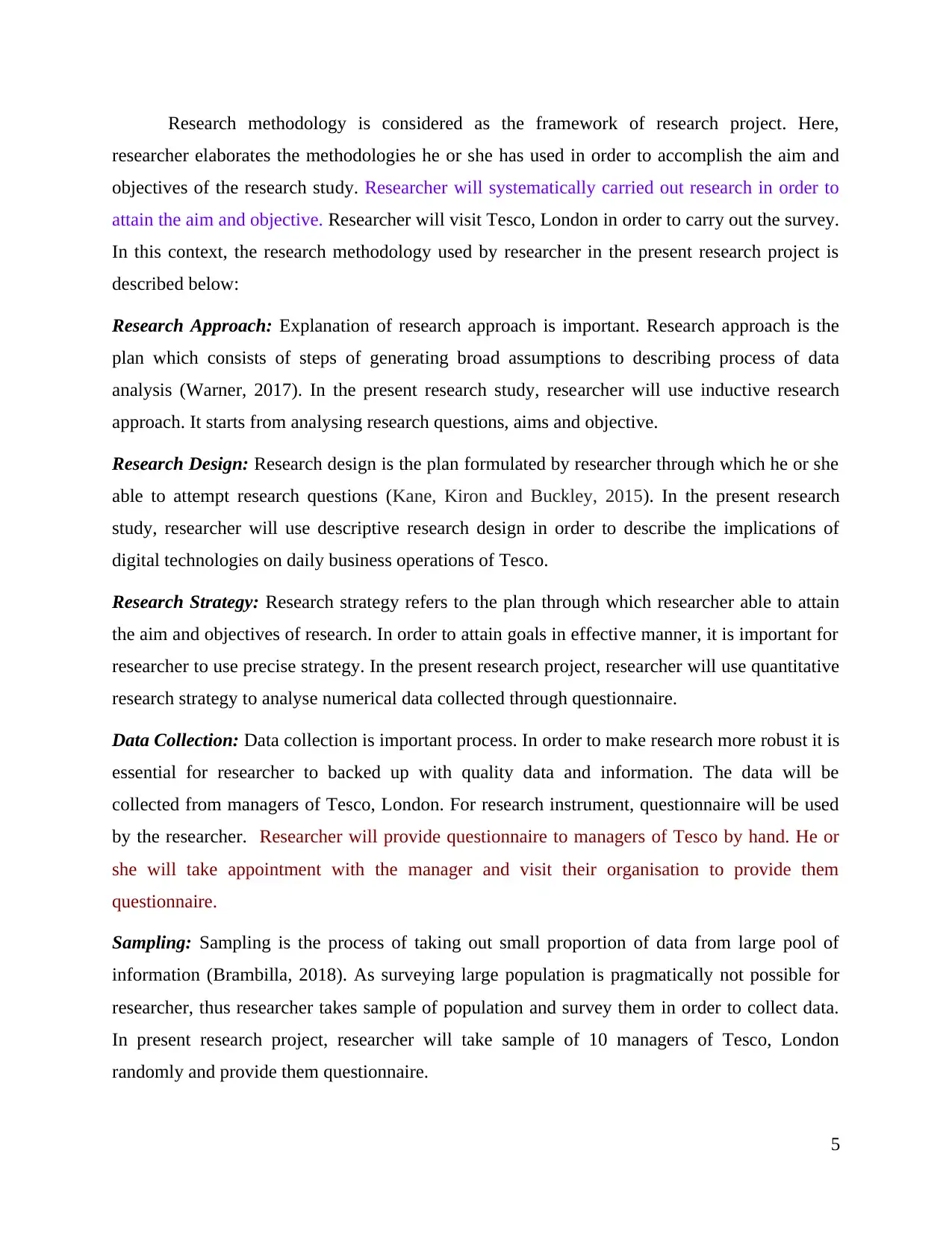
Research methodology is considered as the framework of research project. Here,
researcher elaborates the methodologies he or she has used in order to accomplish the aim and
objectives of the research study. Researcher will systematically carried out research in order to
attain the aim and objective. Researcher will visit Tesco, London in order to carry out the survey.
In this context, the research methodology used by researcher in the present research project is
described below:
Research Approach: Explanation of research approach is important. Research approach is the
plan which consists of steps of generating broad assumptions to describing process of data
analysis (Warner, 2017). In the present research study, researcher will use inductive research
approach. It starts from analysing research questions, aims and objective.
Research Design: Research design is the plan formulated by researcher through which he or she
able to attempt research questions (Kane, Kiron and Buckley, 2015). In the present research
study, researcher will use descriptive research design in order to describe the implications of
digital technologies on daily business operations of Tesco.
Research Strategy: Research strategy refers to the plan through which researcher able to attain
the aim and objectives of research. In order to attain goals in effective manner, it is important for
researcher to use precise strategy. In the present research project, researcher will use quantitative
research strategy to analyse numerical data collected through questionnaire.
Data Collection: Data collection is important process. In order to make research more robust it is
essential for researcher to backed up with quality data and information. The data will be
collected from managers of Tesco, London. For research instrument, questionnaire will be used
by the researcher. Researcher will provide questionnaire to managers of Tesco by hand. He or
she will take appointment with the manager and visit their organisation to provide them
questionnaire.
Sampling: Sampling is the process of taking out small proportion of data from large pool of
information (Brambilla, 2018). As surveying large population is pragmatically not possible for
researcher, thus researcher takes sample of population and survey them in order to collect data.
In present research project, researcher will take sample of 10 managers of Tesco, London
randomly and provide them questionnaire.
5
researcher elaborates the methodologies he or she has used in order to accomplish the aim and
objectives of the research study. Researcher will systematically carried out research in order to
attain the aim and objective. Researcher will visit Tesco, London in order to carry out the survey.
In this context, the research methodology used by researcher in the present research project is
described below:
Research Approach: Explanation of research approach is important. Research approach is the
plan which consists of steps of generating broad assumptions to describing process of data
analysis (Warner, 2017). In the present research study, researcher will use inductive research
approach. It starts from analysing research questions, aims and objective.
Research Design: Research design is the plan formulated by researcher through which he or she
able to attempt research questions (Kane, Kiron and Buckley, 2015). In the present research
study, researcher will use descriptive research design in order to describe the implications of
digital technologies on daily business operations of Tesco.
Research Strategy: Research strategy refers to the plan through which researcher able to attain
the aim and objectives of research. In order to attain goals in effective manner, it is important for
researcher to use precise strategy. In the present research project, researcher will use quantitative
research strategy to analyse numerical data collected through questionnaire.
Data Collection: Data collection is important process. In order to make research more robust it is
essential for researcher to backed up with quality data and information. The data will be
collected from managers of Tesco, London. For research instrument, questionnaire will be used
by the researcher. Researcher will provide questionnaire to managers of Tesco by hand. He or
she will take appointment with the manager and visit their organisation to provide them
questionnaire.
Sampling: Sampling is the process of taking out small proportion of data from large pool of
information (Brambilla, 2018). As surveying large population is pragmatically not possible for
researcher, thus researcher takes sample of population and survey them in order to collect data.
In present research project, researcher will take sample of 10 managers of Tesco, London
randomly and provide them questionnaire.
5
Paraphrase This Document
Need a fresh take? Get an instant paraphrase of this document with our AI Paraphraser
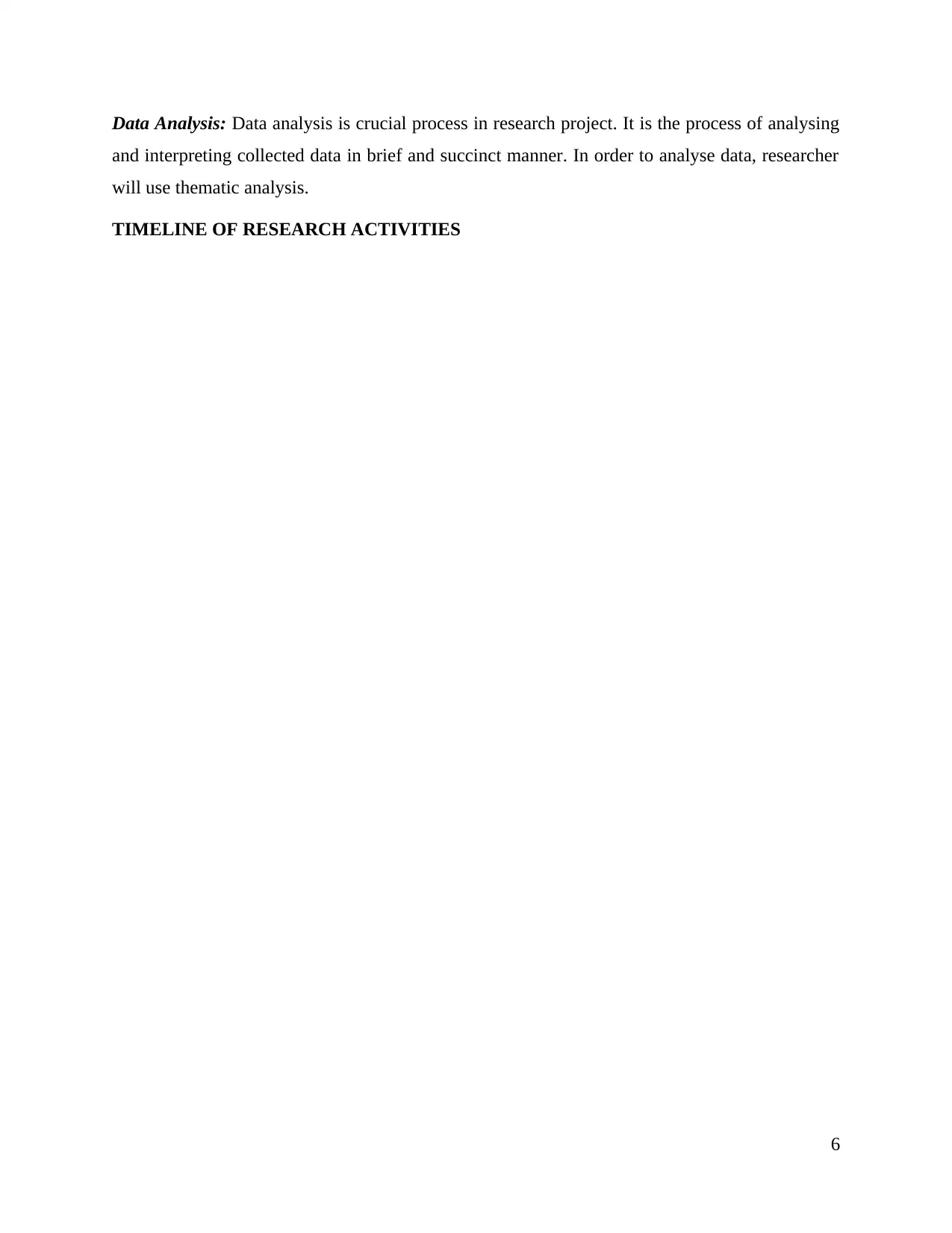
Data Analysis: Data analysis is crucial process in research project. It is the process of analysing
and interpreting collected data in brief and succinct manner. In order to analyse data, researcher
will use thematic analysis.
TIMELINE OF RESEARCH ACTIVITIES
6
and interpreting collected data in brief and succinct manner. In order to analyse data, researcher
will use thematic analysis.
TIMELINE OF RESEARCH ACTIVITIES
6
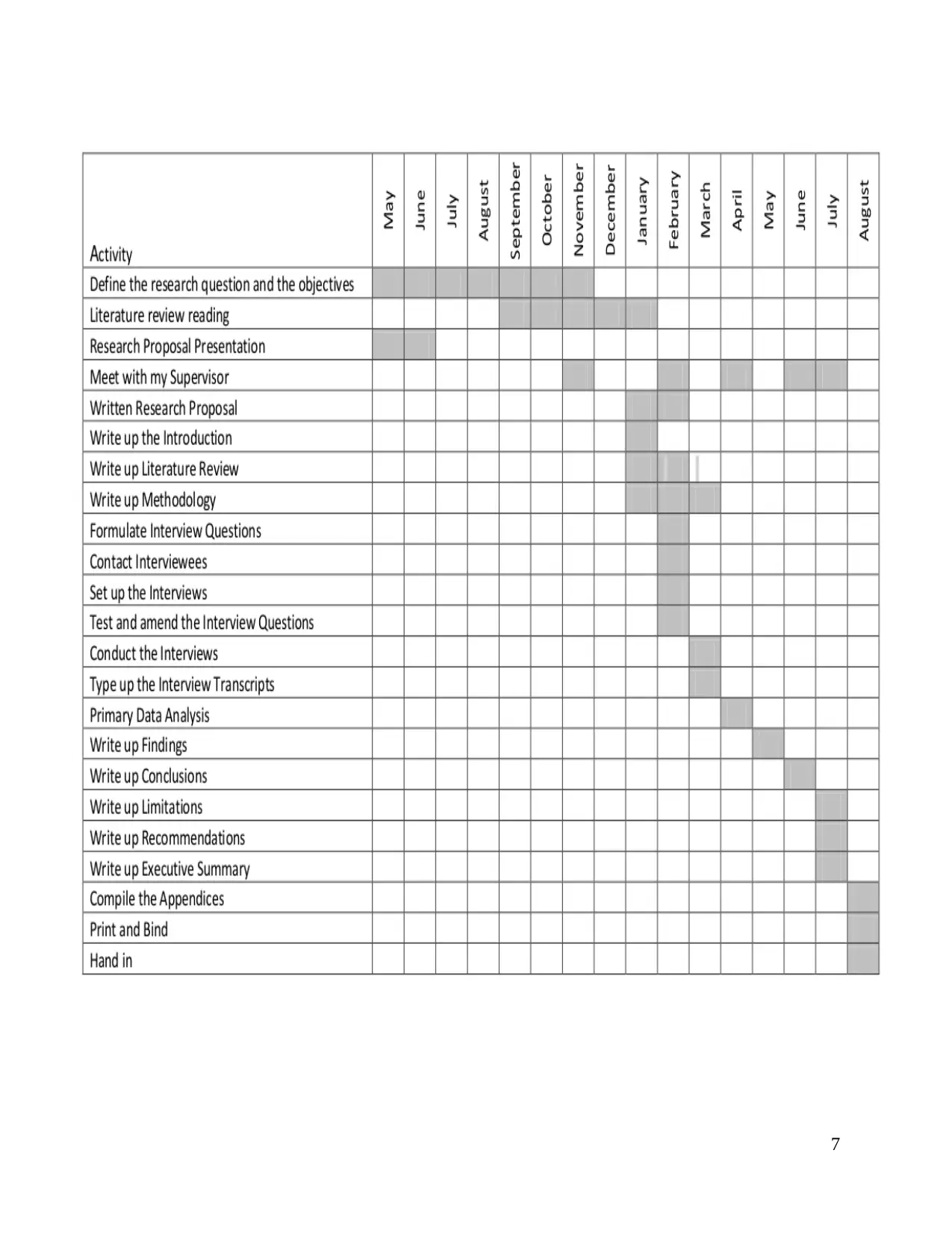
7
⊘ This is a preview!⊘
Do you want full access?
Subscribe today to unlock all pages.

Trusted by 1+ million students worldwide
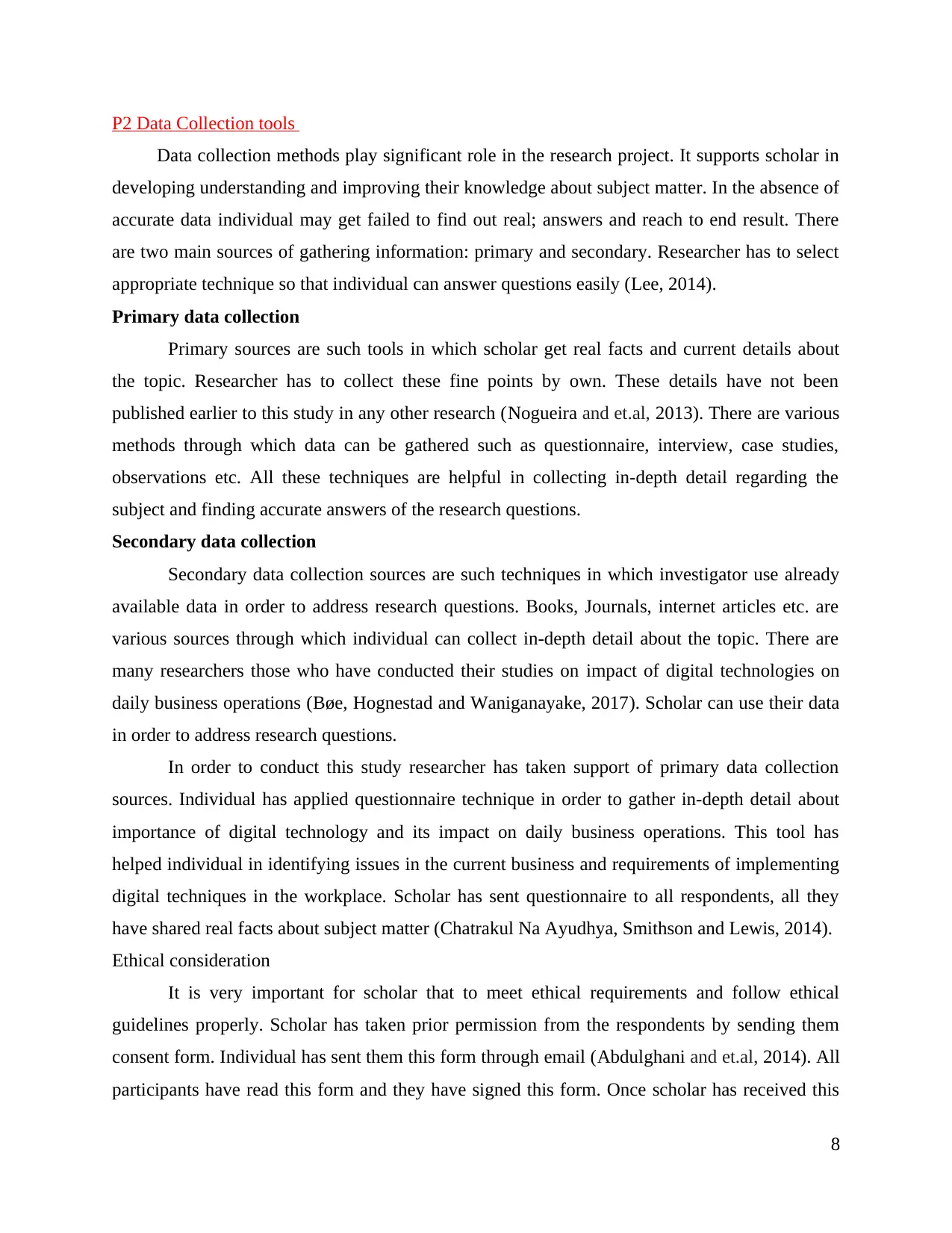
P2 Data Collection tools
Data collection methods play significant role in the research project. It supports scholar in
developing understanding and improving their knowledge about subject matter. In the absence of
accurate data individual may get failed to find out real; answers and reach to end result. There
are two main sources of gathering information: primary and secondary. Researcher has to select
appropriate technique so that individual can answer questions easily (Lee, 2014).
Primary data collection
Primary sources are such tools in which scholar get real facts and current details about
the topic. Researcher has to collect these fine points by own. These details have not been
published earlier to this study in any other research (Nogueira and et.al, 2013). There are various
methods through which data can be gathered such as questionnaire, interview, case studies,
observations etc. All these techniques are helpful in collecting in-depth detail regarding the
subject and finding accurate answers of the research questions.
Secondary data collection
Secondary data collection sources are such techniques in which investigator use already
available data in order to address research questions. Books, Journals, internet articles etc. are
various sources through which individual can collect in-depth detail about the topic. There are
many researchers those who have conducted their studies on impact of digital technologies on
daily business operations (Bøe, Hognestad and Waniganayake, 2017). Scholar can use their data
in order to address research questions.
In order to conduct this study researcher has taken support of primary data collection
sources. Individual has applied questionnaire technique in order to gather in-depth detail about
importance of digital technology and its impact on daily business operations. This tool has
helped individual in identifying issues in the current business and requirements of implementing
digital techniques in the workplace. Scholar has sent questionnaire to all respondents, all they
have shared real facts about subject matter (Chatrakul Na Ayudhya, Smithson and Lewis, 2014).
Ethical consideration
It is very important for scholar that to meet ethical requirements and follow ethical
guidelines properly. Scholar has taken prior permission from the respondents by sending them
consent form. Individual has sent them this form through email (Abdulghani and et.al, 2014). All
participants have read this form and they have signed this form. Once scholar has received this
8
Data collection methods play significant role in the research project. It supports scholar in
developing understanding and improving their knowledge about subject matter. In the absence of
accurate data individual may get failed to find out real; answers and reach to end result. There
are two main sources of gathering information: primary and secondary. Researcher has to select
appropriate technique so that individual can answer questions easily (Lee, 2014).
Primary data collection
Primary sources are such tools in which scholar get real facts and current details about
the topic. Researcher has to collect these fine points by own. These details have not been
published earlier to this study in any other research (Nogueira and et.al, 2013). There are various
methods through which data can be gathered such as questionnaire, interview, case studies,
observations etc. All these techniques are helpful in collecting in-depth detail regarding the
subject and finding accurate answers of the research questions.
Secondary data collection
Secondary data collection sources are such techniques in which investigator use already
available data in order to address research questions. Books, Journals, internet articles etc. are
various sources through which individual can collect in-depth detail about the topic. There are
many researchers those who have conducted their studies on impact of digital technologies on
daily business operations (Bøe, Hognestad and Waniganayake, 2017). Scholar can use their data
in order to address research questions.
In order to conduct this study researcher has taken support of primary data collection
sources. Individual has applied questionnaire technique in order to gather in-depth detail about
importance of digital technology and its impact on daily business operations. This tool has
helped individual in identifying issues in the current business and requirements of implementing
digital techniques in the workplace. Scholar has sent questionnaire to all respondents, all they
have shared real facts about subject matter (Chatrakul Na Ayudhya, Smithson and Lewis, 2014).
Ethical consideration
It is very important for scholar that to meet ethical requirements and follow ethical
guidelines properly. Scholar has taken prior permission from the respondents by sending them
consent form. Individual has sent them this form through email (Abdulghani and et.al, 2014). All
participants have read this form and they have signed this form. Once scholar has received this
8
Paraphrase This Document
Need a fresh take? Get an instant paraphrase of this document with our AI Paraphraser
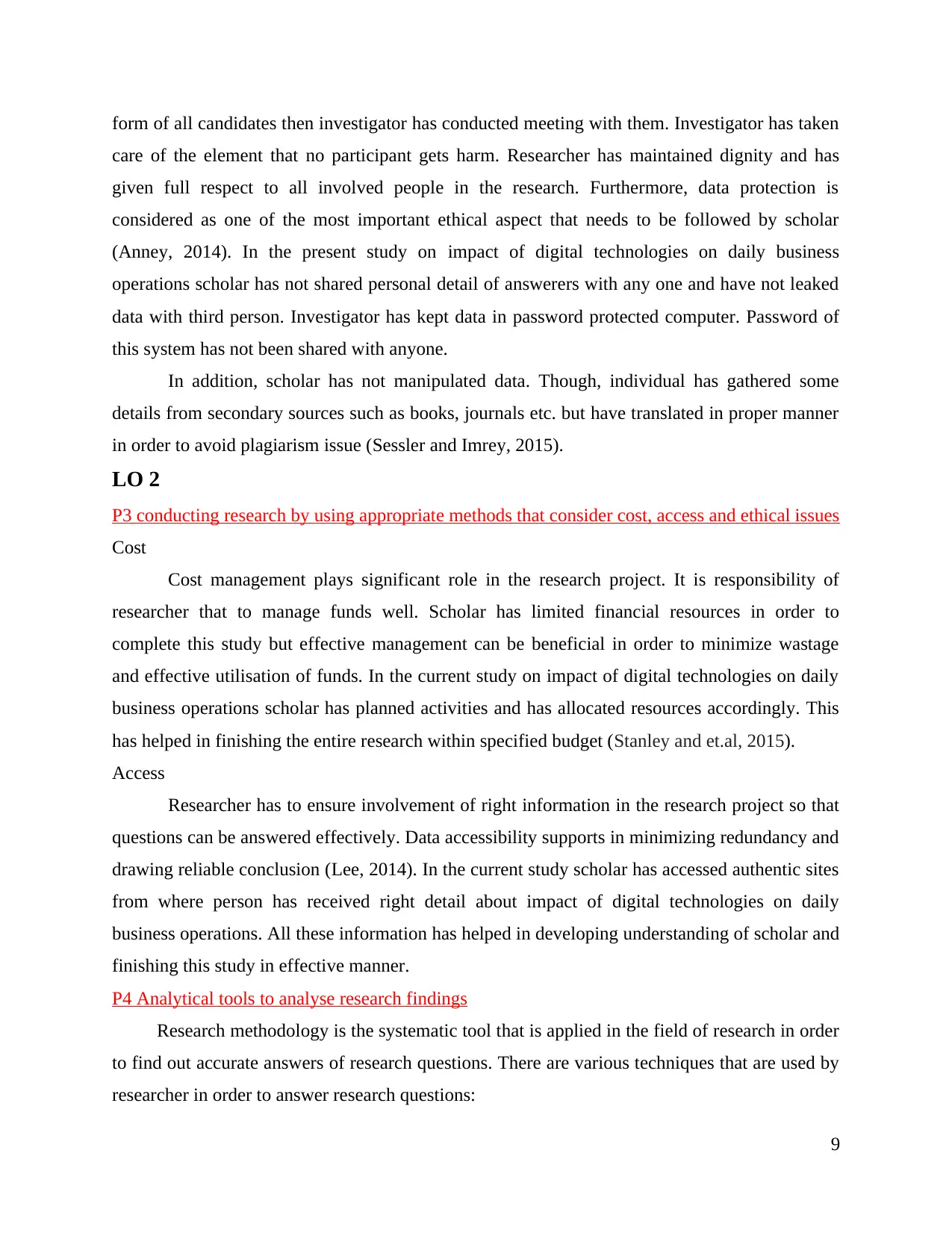
form of all candidates then investigator has conducted meeting with them. Investigator has taken
care of the element that no participant gets harm. Researcher has maintained dignity and has
given full respect to all involved people in the research. Furthermore, data protection is
considered as one of the most important ethical aspect that needs to be followed by scholar
(Anney, 2014). In the present study on impact of digital technologies on daily business
operations scholar has not shared personal detail of answerers with any one and have not leaked
data with third person. Investigator has kept data in password protected computer. Password of
this system has not been shared with anyone.
In addition, scholar has not manipulated data. Though, individual has gathered some
details from secondary sources such as books, journals etc. but have translated in proper manner
in order to avoid plagiarism issue (Sessler and Imrey, 2015).
LO 2
P3 conducting research by using appropriate methods that consider cost, access and ethical issues
Cost
Cost management plays significant role in the research project. It is responsibility of
researcher that to manage funds well. Scholar has limited financial resources in order to
complete this study but effective management can be beneficial in order to minimize wastage
and effective utilisation of funds. In the current study on impact of digital technologies on daily
business operations scholar has planned activities and has allocated resources accordingly. This
has helped in finishing the entire research within specified budget (Stanley and et.al, 2015).
Access
Researcher has to ensure involvement of right information in the research project so that
questions can be answered effectively. Data accessibility supports in minimizing redundancy and
drawing reliable conclusion (Lee, 2014). In the current study scholar has accessed authentic sites
from where person has received right detail about impact of digital technologies on daily
business operations. All these information has helped in developing understanding of scholar and
finishing this study in effective manner.
P4 Analytical tools to analyse research findings
Research methodology is the systematic tool that is applied in the field of research in order
to find out accurate answers of research questions. There are various techniques that are used by
researcher in order to answer research questions:
9
care of the element that no participant gets harm. Researcher has maintained dignity and has
given full respect to all involved people in the research. Furthermore, data protection is
considered as one of the most important ethical aspect that needs to be followed by scholar
(Anney, 2014). In the present study on impact of digital technologies on daily business
operations scholar has not shared personal detail of answerers with any one and have not leaked
data with third person. Investigator has kept data in password protected computer. Password of
this system has not been shared with anyone.
In addition, scholar has not manipulated data. Though, individual has gathered some
details from secondary sources such as books, journals etc. but have translated in proper manner
in order to avoid plagiarism issue (Sessler and Imrey, 2015).
LO 2
P3 conducting research by using appropriate methods that consider cost, access and ethical issues
Cost
Cost management plays significant role in the research project. It is responsibility of
researcher that to manage funds well. Scholar has limited financial resources in order to
complete this study but effective management can be beneficial in order to minimize wastage
and effective utilisation of funds. In the current study on impact of digital technologies on daily
business operations scholar has planned activities and has allocated resources accordingly. This
has helped in finishing the entire research within specified budget (Stanley and et.al, 2015).
Access
Researcher has to ensure involvement of right information in the research project so that
questions can be answered effectively. Data accessibility supports in minimizing redundancy and
drawing reliable conclusion (Lee, 2014). In the current study scholar has accessed authentic sites
from where person has received right detail about impact of digital technologies on daily
business operations. All these information has helped in developing understanding of scholar and
finishing this study in effective manner.
P4 Analytical tools to analyse research findings
Research methodology is the systematic tool that is applied in the field of research in order
to find out accurate answers of research questions. There are various techniques that are used by
researcher in order to answer research questions:
9
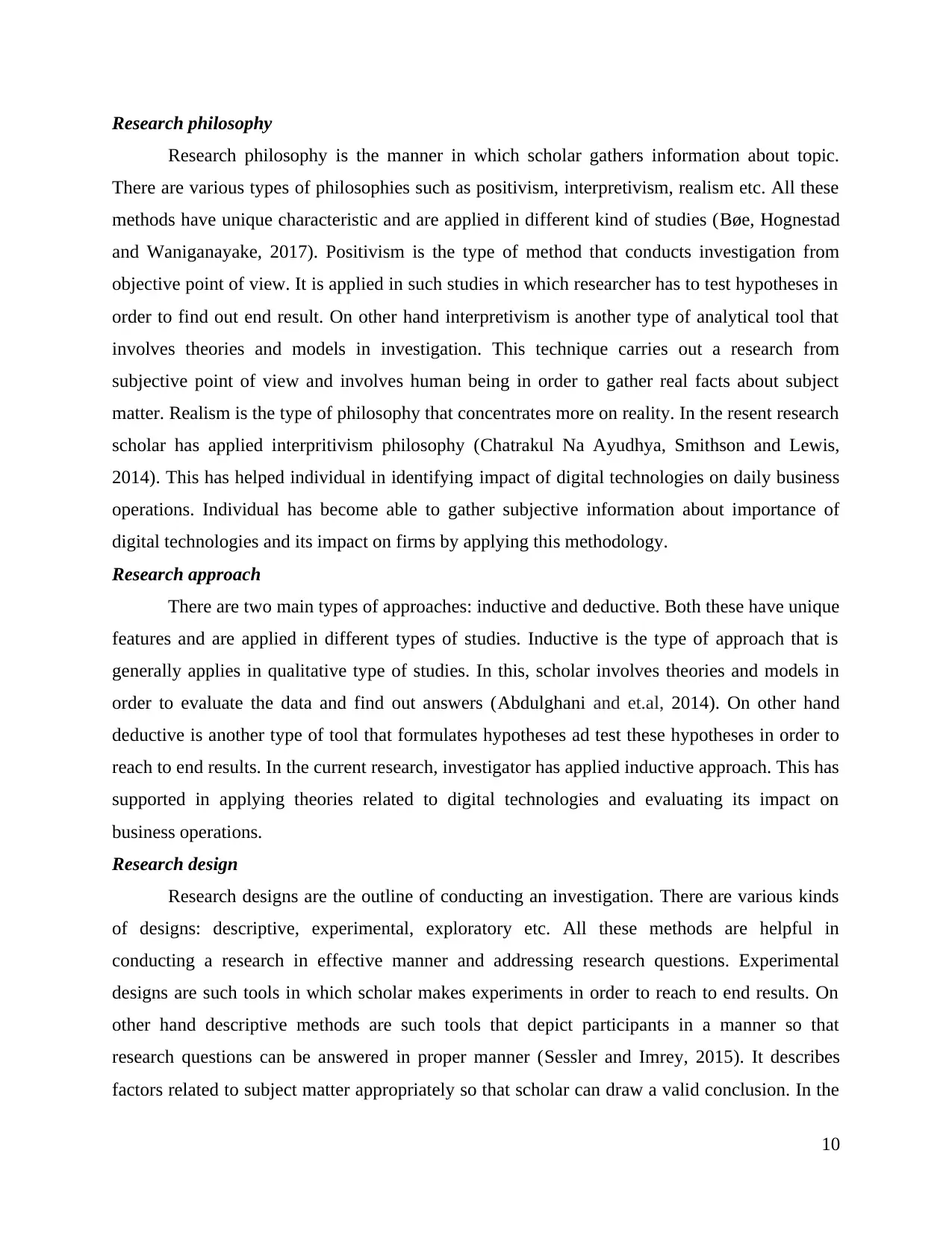
Research philosophy
Research philosophy is the manner in which scholar gathers information about topic.
There are various types of philosophies such as positivism, interpretivism, realism etc. All these
methods have unique characteristic and are applied in different kind of studies (Bøe, Hognestad
and Waniganayake, 2017). Positivism is the type of method that conducts investigation from
objective point of view. It is applied in such studies in which researcher has to test hypotheses in
order to find out end result. On other hand interpretivism is another type of analytical tool that
involves theories and models in investigation. This technique carries out a research from
subjective point of view and involves human being in order to gather real facts about subject
matter. Realism is the type of philosophy that concentrates more on reality. In the resent research
scholar has applied interpritivism philosophy (Chatrakul Na Ayudhya, Smithson and Lewis,
2014). This has helped individual in identifying impact of digital technologies on daily business
operations. Individual has become able to gather subjective information about importance of
digital technologies and its impact on firms by applying this methodology.
Research approach
There are two main types of approaches: inductive and deductive. Both these have unique
features and are applied in different types of studies. Inductive is the type of approach that is
generally applies in qualitative type of studies. In this, scholar involves theories and models in
order to evaluate the data and find out answers (Abdulghani and et.al, 2014). On other hand
deductive is another type of tool that formulates hypotheses ad test these hypotheses in order to
reach to end results. In the current research, investigator has applied inductive approach. This has
supported in applying theories related to digital technologies and evaluating its impact on
business operations.
Research design
Research designs are the outline of conducting an investigation. There are various kinds
of designs: descriptive, experimental, exploratory etc. All these methods are helpful in
conducting a research in effective manner and addressing research questions. Experimental
designs are such tools in which scholar makes experiments in order to reach to end results. On
other hand descriptive methods are such tools that depict participants in a manner so that
research questions can be answered in proper manner (Sessler and Imrey, 2015). It describes
factors related to subject matter appropriately so that scholar can draw a valid conclusion. In the
10
Research philosophy is the manner in which scholar gathers information about topic.
There are various types of philosophies such as positivism, interpretivism, realism etc. All these
methods have unique characteristic and are applied in different kind of studies (Bøe, Hognestad
and Waniganayake, 2017). Positivism is the type of method that conducts investigation from
objective point of view. It is applied in such studies in which researcher has to test hypotheses in
order to find out end result. On other hand interpretivism is another type of analytical tool that
involves theories and models in investigation. This technique carries out a research from
subjective point of view and involves human being in order to gather real facts about subject
matter. Realism is the type of philosophy that concentrates more on reality. In the resent research
scholar has applied interpritivism philosophy (Chatrakul Na Ayudhya, Smithson and Lewis,
2014). This has helped individual in identifying impact of digital technologies on daily business
operations. Individual has become able to gather subjective information about importance of
digital technologies and its impact on firms by applying this methodology.
Research approach
There are two main types of approaches: inductive and deductive. Both these have unique
features and are applied in different types of studies. Inductive is the type of approach that is
generally applies in qualitative type of studies. In this, scholar involves theories and models in
order to evaluate the data and find out answers (Abdulghani and et.al, 2014). On other hand
deductive is another type of tool that formulates hypotheses ad test these hypotheses in order to
reach to end results. In the current research, investigator has applied inductive approach. This has
supported in applying theories related to digital technologies and evaluating its impact on
business operations.
Research design
Research designs are the outline of conducting an investigation. There are various kinds
of designs: descriptive, experimental, exploratory etc. All these methods are helpful in
conducting a research in effective manner and addressing research questions. Experimental
designs are such tools in which scholar makes experiments in order to reach to end results. On
other hand descriptive methods are such tools that depict participants in a manner so that
research questions can be answered in proper manner (Sessler and Imrey, 2015). It describes
factors related to subject matter appropriately so that scholar can draw a valid conclusion. In the
10
⊘ This is a preview!⊘
Do you want full access?
Subscribe today to unlock all pages.

Trusted by 1+ million students worldwide
1 out of 29
Related Documents
Your All-in-One AI-Powered Toolkit for Academic Success.
+13062052269
info@desklib.com
Available 24*7 on WhatsApp / Email
![[object Object]](/_next/static/media/star-bottom.7253800d.svg)
Unlock your academic potential
Copyright © 2020–2026 A2Z Services. All Rights Reserved. Developed and managed by ZUCOL.





